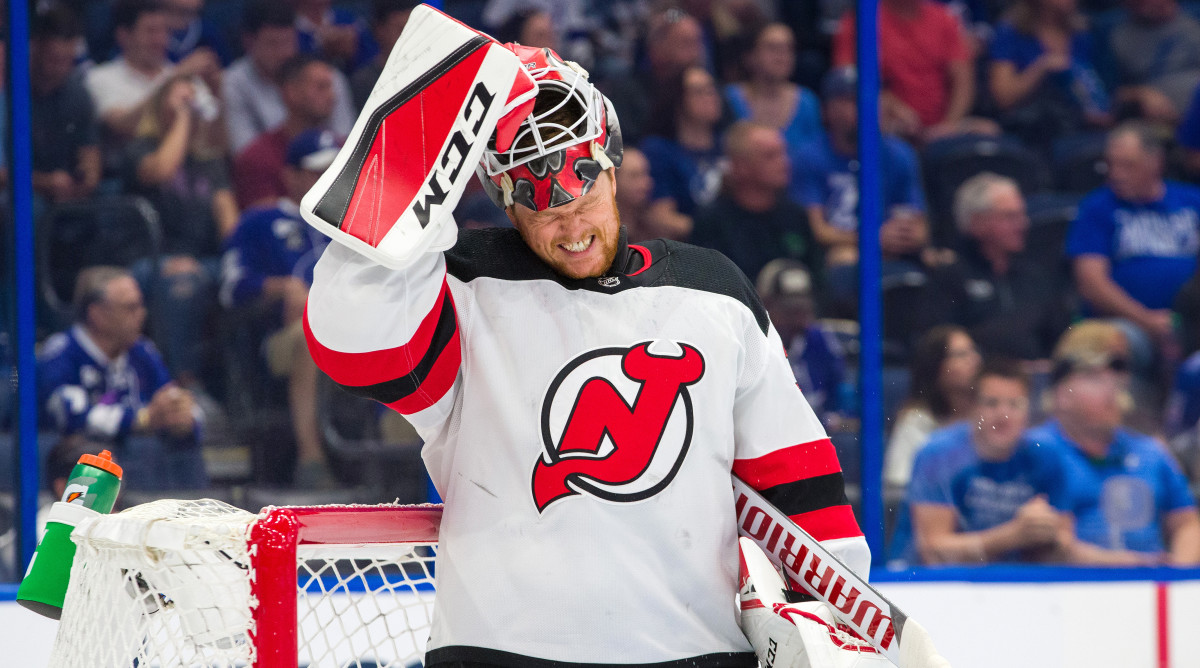The Devils' Options Are Limited for Struggling Goaltender Cory Schneider

Cory Schneider starred in hockey’s prime-time goaltending drama that began eight years ago. Then a 24-year-old fresh on the scene, Schneider and fellow Canucks’ staple Roberto Luongo combined for a league-leading 2.20 goals against average in 2010–11 and propelled Vancouver to the Stanley Cup Final. The Canucks fumbled their newfound goalie gold mine, attempted to trade Luongo, traded away Schneider and made the playoffs just once in the next five seasons.
Schneider now finds himself on the other side of the NHL’s latest goalie saga, but one that resembles a tragedy. The Devils are giving up 3.5 goals per game (fifth worse in the league). Schneider is the aging netminder. He’s the one with a borderline unmovable $6 million AAV contract. And, he’s not playing well. At all.
In his recent appearance against the Tampa Bay Lightning, Schneider gave up a goal on the first shot he faced. Schneider surrendered four first period goals in his last start, also against the Lightning, leading him to say after that game, “It’s tough when your goalie gives away the game in the first period.” He’s not wrong, but his remarks are tinged with a sad realization of his current situation.
Since returning from offseason hip surgery, the 32-year-old goalie has gone winless in five starts with a .862 save percentage and 4.19 goals against average in seven appearances. Schneider has let in two first-period goals in four of those five starts and hasn’t looked anything close to the player he was when he took the reins from Martin Brodeur.
And Father Time looms over Schneider’s descent from stardom. He hit his 30’s in the 2015–16 season, and since then Schneider has recorded .924, .908, .907 save percentages. At the same time, the ageless Pekka Rinne, who also had offseason hip surgery, is recording the best goals against average and save percentage of his career.
Keith Kinkaid provided above-average production while Schneider was out at the start of the season, but now, with Schneider back and Kinkaid’s recent struggles, the Devils can’t find any consistency in net. Kinkaid has posted a 4.17 goals against average and .872 save percentage in his last five starts. Meet the Devils’ netminders: a former gem that’s lost all it’s luster but still has the same price, and a diamond in the rough that’s turned into an ordinary stone.
The Devils tried playing a balancing act with their goalies in last year’s playoffs against the Lightning, and the situation became more complicated when Kinkaid fell flat and Schneider played at an elite level. And now the Devils are left with no good options: Kinkaid is in his final year of his $1.25 million contract. No potential trade suitors will gamble on Schneider with three years remaining on his deal. Another get-right trip down to the AHL serves as a roadblock in 21-year-old netminder Mackenzie Blackwood’s development. A buyout would encumber the Devils with $2 million a year in dead cap space every year until 2025.
So, what can the Devils do? Hope, and play better defense.
The Devils defense has ranged from good, to awful (defenseman Sami Vatanen smashed a puck for an own goal against Tampa last week), but usually trend toward the bad end of that spectrum. On most of Schneider’s 21 goals against, there’s a Devils giveaway, a defender leaving his man unattended, or a completely helpless Schneider on a cross-ice setup.
In five-on-five situations, Schneider is facing two more high-danger shots against per 60 minutes compared to Kinkaid, and his goals against come from an average of almost six feet closer to the net, according to Natural Stattrick. (Schneider, though, has one of the worst high-danger save percentage in the league.)
Schneider won’t look as bad as his stat line once the defensive support rides in. While Schneider hopes and waits for that, maybe he needs more time to bounce back from surgery. Maybe he’ll return to league-average form. Or maybe he’ll even turn into the Schneider fans saw against the Lighting in the playoffs (unlikely).
All those maybes and hopes carry an $18 million price tag over the next three years. But the Devils, unlike the 2011–12 Canucks, aren’t coming off a Stanley Cup appearance. The Devils have time, but time is working against the 32-year-old Schneider.
































